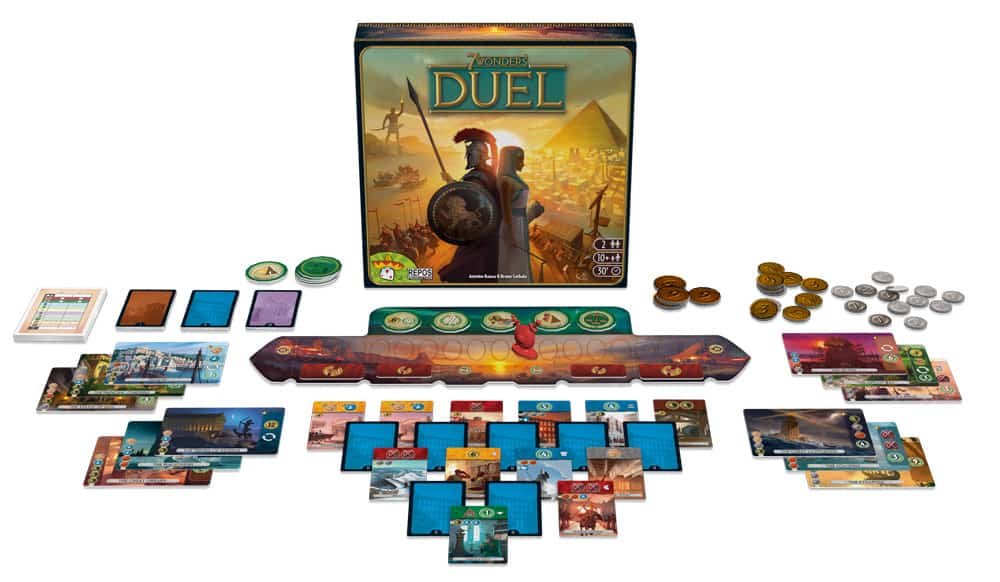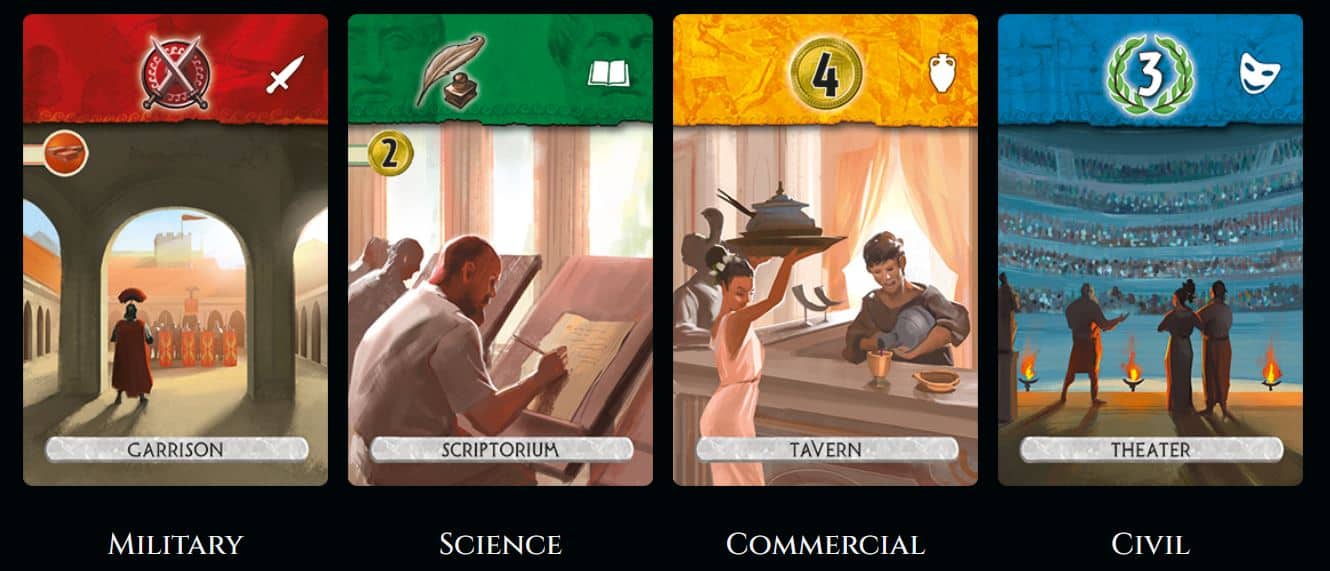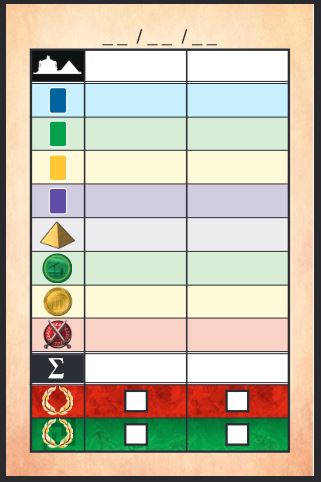7 Wonders Duel is a popular two-player card drafting and civilization-building board game based on the original 7 Wonders game.
Compared to the original game, 7 Wonders Duel is tailored for two players, making it an excellent choice for couples or pairs of friends seeking a strategic and competitive experience. While both games share the card drafting mechanic and the goal of building a thriving civilization, 7 Wonders Duel condenses the gameplay, offering a more intense and head-to-head competition.
Whether you’re a fan of the original 7 Wonders or a new player looking for a two-player card game with rich strategy, 7 Wonders Duel offers a compelling alternative that captures the essence of its predecessor while catering to a smaller player count.
What’s included in 7 Wonders Duel?

- Game Board: The game board represents the progress of the civilizations through three ages, with cards placed in a pyramid formation for each age. It also features various military conflict tracks, a science track, and a resource market.
- Wonder Cards: There are seven Wonder Cards available to each player at the beginning of the game. Players choose one of these cards to represent their civilization’s unique abilities and goals. These cards are placed in front of the players and serve as the foundation of their civilizations.
- Civilian and Military Victory Tokens: Victory tokens are used to keep track of civilian and military points scored during the game. Civilian tokens are used to count points from buildings, wonders, and other sources, while military tokens determine military dominance in each age.
- Resource Cards: Resource cards represent various types of goods such as wood, stone, clay, papyrus, and glass. These cards are used to pay for the construction of buildings and wonders.
- Science Cards: Science cards are special cards that grant players scientific discoveries. There are three types of science symbols: compasses, tablets, and gears. Players can collect sets of these symbols to earn points.
- Guild Cards: Guild cards are special buildings that become available in the third age. They provide various ways to score points based on the state of the game and the buildings in a player’s civilization.
- Progress Tokens: These tokens are placed on certain cards in the pyramid during setup. When a card is uncovered, the player who uncovers it gains the associated progress token, providing various advantages or actions.
- Military Conflict Tokens: These tokens are used to track military conflicts in each age. Players move their tokens along the military track to indicate their level of military strength.
- Coins: Coins represent currency in the game and are used to purchase resource cards, construct buildings, and pay for wonders.
- Conflict Pawn: This pawn is used to mark the current player’s turn in the game.
- Age Card Deck: The deck of age cards contains a variety of buildings, wonders, and other cards that players can acquire and use to develop their civilizations.
- Science Token: This token is placed on the science track to indicate the progress of the players in collecting science symbols.
- Storage Boards: Each player has a storage board to organize their resources, buildings, and wonders during the game.
How to play 7 wonders Duel
The objective of “7 Wonders Duel” is to accumulate the most victory points by the end of the game. Victory points can be earned through various means, such as constructing structures, achieving scientific discoveries, winning military conflicts, and obtaining guild cards.

Player count and game length
7 Wonders Duel is designed specifically for two players. The duration of a game of “7 Wonders Duel” can vary depending on the experience of the players and the strategies they employ. On average, a game typically takes around 30 to 45 minutes to complete.
Setup
- Place the central board in the center of the table.
- Shuffle the Age I, Age II, and Age III cards separately, then draw and arrange them face-up on the board in a pyramid shape, with Age I at the bottom, Age II in the middle, and Age III at the top.
- Place the Conflict Pawn on the central board between the two pyramids.
- Shuffle the Guild cards and place them face-down next to the central board.
- Give each player a Wonder board. Players choose one of the two sides, ensuring they have the same letter (A or B) facing up.
- Place the Military token on the “0” space of the Military track on the central board.
- Shuffle the Progress tokens and draw four of them face-up next to the central board.
- Prepare the Coins, Science tokens, and Civilian structures (blue cards) in separate piles near the central board.
- Give each player three coins as starting resources.
7 Wonders Duel Rules
The game is played over three Ages, with each Age consisting of multiple turns. Each turn follows these steps:
- Reveal and Draft Cards: At the beginning of each Age, reveal a set number of cards as specified on the central board. Players take turns choosing one card at a time until there are none left. The unchosen cards are discarded.
- Resolve Military Conflicts: Check the Military track after each Age. If one player is ahead, they advance the Conflict Pawn to the opponent’s side of the track. If the pawn reaches the opponent’s capital, the game ends, and the player with the pawn on their side of the track loses immediately. Otherwise, the player behind on the track gains coins equal to the difference in military strength.
- Construct Structures: Players can now construct one card from their hand by paying its construction cost, which is located at the top-left corner of the card. Some structures also have prerequisites, meaning you must have specific structures built before constructing them. You can use resources, trade with your opponent, or use your Wonder’s abilities to pay for construction.
- Collect Coins: Gain coins equal to your Wonder’s current stage (0, 1, 2, or 3).
- Science Tokens: If you construct a structure with a science symbol, you may choose a Science token, which provides one of three types of scientific progress: compasses, tablets, or gears. Collecting sets of these tokens yields substantial points.
- Progress Tokens: If you fulfill the requirements listed on a Progress token, you can claim it for an immediate benefit or end-game points.
- Guild Cards: When certain conditions are met, such as constructing specific structures, players can claim Guild cards, which offer points based on various criteria.
- Wonders: During the game, players can choose to construct stages of their Wonder instead of constructing a card. Each Wonder stage provides unique benefits, including resources, coins, and special abilities.
End of the Game: The game can end in three ways:
- A player advances the Conflict Pawn to the opponent’s capital, resulting in an immediate victory for the advancing player.
- The Age III cards are drafted, and the game ends. Players calculate their final scores.
- A player constructs their Wonder’s third stage, which triggers the end of the game. Players calculate their final scores.
Scoring: Calculate points based on the following:

- Victory points on constructed structures.
- Points from collected guild cards.
- Points from Progress tokens.
- Points from scientific progress (sets of compasses, tablets, and gears).
- Points from military conflicts.
The player with the most points wins. If there’s a tie, the player with the most coins wins.
For the official rules, see the link below:
How to win 7 Wonders Duel
- Balance Your Strategy:
- It’s crucial to have a balanced approach to your civilization’s development. Don’t focus too heavily on one aspect, such as military or science, at the expense of others. A well-rounded strategy often yields the best results.
- Early Military Advantage:
- In the early Ages, consider gaining a military advantage. Winning military conflicts can grant you coins and push the Conflict Pawn closer to your opponent’s capital, potentially leading to victory.
- If you decide to pursue military, focus on building structures that provide military strength (shields) and prioritize these cards during the card drafting phase.
- Science:
- Scientific progress can lead to significant points. Collecting sets of science symbols (compasses, tablets, and gears) can give you a substantial advantage.
- Keep an eye on what science symbols your opponent is collecting and try to deny them access to crucial science cards.
- Civilian Structures:
- Civilian structures (blue cards) provide a steady source of victory points. Prioritize building these, especially if you have access to cards that provide a multiplier for them.
- Make use of Wonder abilities and resources to construct civilian structures efficiently.
- Wonders:
- Strategically choose when to build stages of your Wonder. The resources and abilities provided by Wonder stages can greatly impact your gameplay.
- Remember that completing the third stage of your Wonder triggers the end of the game. Consider this timing carefully to maximize your score.
- Guild Cards:
- Keep an eye on the guild cards that are available and aim to construct structures that meet the requirements for claiming them. Guild cards can provide a significant point boost at the end of the game.
- Resource Management:
- Efficiently managing resources is essential. Use trade options to acquire resources you lack or to prevent your opponent from gaining crucial resources.
- Don’t stockpile too many resources without a clear plan for using them, as they could be better invested in structures or advancements.
- Progress Tokens:
- Progress tokens can provide immediate benefits or end-game points. Aim to collect tokens that align with your strategy and the cards you’re constructing.
- Card Drafting:
- Pay close attention to the cards available during the card drafting phase. Make informed choices based on your strategy and what you believe will benefit your civilization the most.
- Be mindful of denying your opponent access to key cards, especially if they are pursuing a specific strategy.
- Adapt to Your Opponent:
- Be flexible in your approach and adapt to your opponent’s actions. If you see them heavily investing in a particular strategy, consider countering it or finding an alternative path to victory.
- Keep an Eye on the End Game:
- As you approach the later Ages, start considering your end-game scoring potential. Ensure you have a plan in place to maximize your points during final scoring.
- Pay Attention to Coins:
- Coins are valuable resources that can be used to construct structures, purchase resources, and fend off military defeats. Don’t underestimate their importance in your strategy.